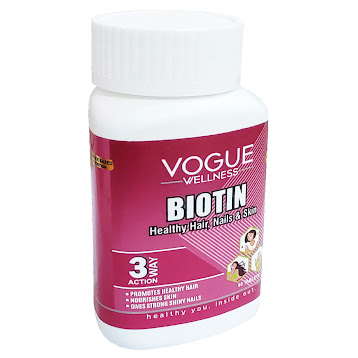Biotin Benefits the Entire Body — Does that Include Your Hair?
The body uses biotin as a coenzyme for the metabolism of fatty acids, amino acids, and glucose. This means that biotin, commonly known as vitamin B7, is necessary for the conversion and utilisation of foods that are sources of lipids, proteins, and carbs.
The
energy required for physical activity, healthy psychological function, and
growth is then available to our bodies.
Since
this vitamin is essential to the health of our skin, hair, and nails, one of
the benefits of biotin is that it helps us seem young and appealing. It even
goes by the moniker "H vitamin" on occasion. This comes from the
German terms for "hair and skin," Haar and Haut.
Is it possible to grow hair with biotin? Let's look at.
What Is Biotin?
The vitamin B complex, or biotin, is a set of essential nutrients
required for good metabolic, neurological, digestive, and cardiovascular
functioning. Biotin, also known as vitamin B7, is a water-soluble vitamin.
In countries where people normally consume adequate calories and food
overall, a vitamin B7/biotin deficit is uncommon. This is primarily due to
three factors:
1. The suggested daily requirements are modest.
2. Several foods rich in biotin are consumed regularly.
3. According to researchers, some of the digesting bacteria in our
intestines have the capacity to produce biotin on their own.
Biotin Products
Consumers
who want longer, healthier hair and nails have started to favour biotin supplements. You have a variety of options if you want to take a biotin
supplement for this reason or to improve your health, including biotin pills,
biotin vitamins that also contain other B vitamins, biotin-containing cosmetics
serums and lotions, and biotin shampoos.
You
can get supplements over-the-counter in the form of tablets or capsules. You
can also buy liquid biotin online or at your neighbourhood vitamin store.
B-complex
pills, which contain a whole range of B vitamins, including vitamin B6, vitamin
B12, and vitamin B7, are another source of vitamin B7.
B12, riboflavin, and niacin, all of which are
vitamins. The B vitamin complex supports a variety of vital daily processes
including metabolism, brain and nerve transmission, and many more.
Taking B vitamins together is always the greatest
method to be sure you'll receive the most results because the vitamins function
well with one another.
Biotin for Hair Growth?
One
sign of a biotin deficit is thinning hair, but as was already mentioned, this
condition is uncommon.
Moreover,
vitamin B7 is frequently used in hair and skin care products despite the fact
that it is thought to not be particularly effectively absorbed through the
skin. According to some study, ingesting biotin via food sources (such foods
high in B vitamins) or supplements may provide the most health benefits.
How
can you get enough biotin in your diet? by consuming foods high in biotin, such
as organ meats, eggs, avocado, cauliflower, berries, salmon, beans, and
mushrooms.
The
benefits of biotin do seem to support the synthesis of keratin and other
proteins required for maintaining youthful skin and hair.
Takingdaily supplements containing biotin for about three to six months has beenshown to help promote hair growth and lessen hair shedding, according to at
least a few studies, including ones published in the journals Dermatology
Research and Practice and Journal of Clinical and Aesthetic Dermatology. One of
these studies discovered that after 90 days, those using the biotin-containing
supplements noticed increases in overall hair volume, scalp coverage, and hair
body thickness. After 180 days, they also noticed improvements in hair shine,
skin moisture retention, and skin smoothness.
According to a 2017 analysis that looked at how well biotin promotes
hair growth, "we discovered 18 reported examples of biotin use for hairand nail alterations. In every instance, patients getting biotin supplements
had a pathology causing poor nail or hair growth. After receiving biotin, all
cases demonstrated clinical improvement.
Yet, the review's conclusion suggests that supplementing with biotin may
only be worthwhile for those who are lacking in the vitamin (which, again, is
rare).
Benefits
1. Supports a Healthy Metabolism
Gene
expressions that are essential for carrying out metabolic processes are
controlled by biotin. The conversion of food into usable energy that supports a
healthy metabolism requires vitamin B7 and other B vitamins.
This
is accomplished in numerous ways:
• It
transforms glucose from carbohydrate and sugar sources into consumable
"fuel," the body's primary source of energy.
• It
facilitates the body's use of amino acids from proteins for a variety of bodily
processes.
• It
causes the fatty acids in foods high in fat, such as oils and animal fats, to become
active.
If
the body is deficient in vitamin B7, symptoms such as low energy, exhaustion,
weight gain, digestive issues, the potential for diabetes development, changes
in appetite, bad moods, and more may emerge.
Normal,
healthy metabolic activity won't start until the body can use food's
macronutrients as fuel. Moreover, vitamin B7 enhances the way that glucose is
metabolised and utilised, providing some defence against insulin resistance and
type 2 diabetes.
2.
May Increase Glucose Tolerance and Aid in Blood Sugar Balancing
It
has been demonstrated that vitamin B7, particularly when coupled with chromium,
helps diabetics control their blood sugar levels. This is particularly valid
for people whose blood glucose (sugar) levels are not effectively managed by
prescribed medications.
Because it makes insulin more active, which is a critical hormone
required to restore balance to blood sugar levels, biotin lowers blood glucose
levels. Greater insulin sensitivity lowers the chance of having blood sugar
levels that fluctuate greatly, which can cause symptoms of prediabetes, type 2
diabetes, weight gain, and different types of metabolic syndrome.
Less sugar is released into the bloodstream as a result of biotin's
reduction in the expression of enzymes that encourage the liver to produce
glucose. Because of this, vitamin B7 deficiency has been associated to poor
glucose utilisation and impaired glucose tolerance, both of which are risk
factors for diabetes.
Moreover, vitamin B7 can aid in easing diabetes-related symptoms
including nerve pain.
3. Maintains Healthy Hair, Skin and Nails
Because
vitamin B7 is essential for healthy skin, hair, and nails, signs of a vitamin
B7 shortage can include brittle, thinning hair that splits easily, or
dermatitis, which causes dry, itchy skin.
How
might biotin aid in the growth of hair? The production of proteins and enzymes
required for hair growth can be supported and biotin deficiency can be reversed
by taking a biotin supplement, also known as a "vitamin for hair growth,"
as certain supplements may be marketed.
As
biotin has been found to improve the structure of keratin, a protein that
produces hair, and to improve protein synthesis, it has been demonstrated to
benefit hair.
up
skin, nails, and hair. It's important to keep in mind that lack of other
minerals, such as zinc, selenium, and iron, as well as several medical issues
like hormonal imbalances and endocrine disorders, may also be to blame for hair
thinning.
High
doses of biotin may also be used to cure brittle nails and thin hair, per
research. In fact, this vitamin B7 benefit was initially identified when biotin
was successfully used to cure problems with horses' hoofs becoming brittle and
damaged.
Additional
advantages of biotin include its ability to shield skin from rashes, extreme
dryness, fungal infections, acne, and other inflammatory conditions.
It's crucial to remember that, despite the fact that biotin may be found
in many over-the-counter beauty treatments like hair masques and face creams,
it seems to work considerably better when used orally.
4. Prevents Cognitive Decline and Maintains Brain Health
Due to its part in neurotransmitter function and nerve signalling,
biotin is good for the nervous system. B vitamins work synergistically to
improve memory and protect against age-related cognitive decline, including
dementia and neurodegenerative diseases like Alzheimer's disease.
B vitamins, such vitamin B7, aid in maintaining a happy outlook,
boosting energy, and sharpening concentration because they play a part in the
synthesis of hormones linked to mood control.
5. Supports Cardiovascular System Health
The primary causes of heart disease, such as inflammation,
atherosclerosis (or plaque buildup in the arteries), heart attacks, and stroke,
can be prevented in part by taking B vitamins such vitamin B7.
According to certain research, chromium and vitamin B7 combined can help
lower cholesterol levels. According to studies, vitamin B7 increases
"good" HDL cholesterol while decreasing "bad" LDL
cholesterol and triglyceride levels.
This is particularly true for diabetics who are at risk for heart
disease.
6. Promotes Adrenal and Thyroid Function
For healthy thyroid function and protection against adrenal fatigue, B
vitamins like vitamin B7/biotin are required. Hunger, sleep, pain perception,
mood, and energy are just a few of the many bodily states that the thyroid and
adrenal glands regulate.
B vitamin deficiencies have been linked to thyroid and adrenal problems,
which can lead to a variety of unpleasant symptoms like exhaustion, weight gain
or loss, difficulty sleeping, and more.
Having said that, if you have a history of thyroid malfunction, it's
crucial to consult with your doctor because there is evidence that taking very
high doses of biotin can result in inaccurate results on different
thyroid/endocrine laboratory tests.
7. Essential for Muscle and Tissue Growth and Healing
Benefits of biotin include assisting
in muscle repair and development as well as growth and maintenance of
biological structures. B vitamins, such as vitamin B7 biotin, work to rebuild
the strength of muscle and tissue that is lost when tissue or muscle is broken
down, allowing for growth.
B vitamins also aid in reducing
inflammation, which can cause aches, pains, or difficulty moving in the muscles
or joints. Even more significantly, a lack of vitamin B7 and other B vitamins
can impair foetal and infant development and restrict growth.





Comments
Post a Comment